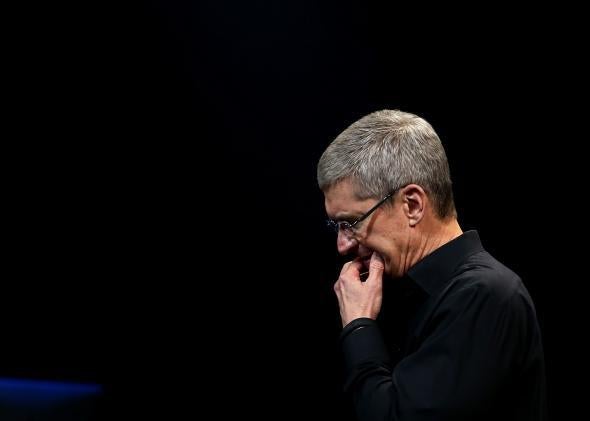Apple is making plenty of money. The company announced on Monday that it took in $37.5 billion over the past three months, up from $36 billion in the same quarter last year. And it turned a healthy $7.5 billion profit. But it has a problem: Those profits are finally leveling off after nearly a decade of extraordinary growth.
“Apple’s business is stronger than ever,” insisted CEO Tim Cook in a call with investors and reporters on Monday. “We’re winning with our products in all the ways that are most important to us.” He went on to mention the company’s top marks in customer satisfaction, product usage, and customer loyalty.
But Wall Street wants growth, not customer loyalty. And so the company’s stock took a dip after hours, despite its strong performance.
The obvious way to achieve that growth would be to focus on selling more products and building Apple’s share of the ever-growing global markets for smartphones, tablets, and computers. But market share, to Cook, is something of a dirty word. He’s said it before, and he said it again Monday: “We’re not focused on market share.”
Fair enough: Cook clearly cares more about quality than quantity. And that approach has served Apple extremely well over the years. By carving out the juicy high end of every market, it has been able to kick back and enjoy fat profit margins while its competitors tussle for scraps. Most notably, Apple’s iPhones have dominated the luxury smartphone market, accounting for a huge share of the company’s revenue and profits.
That market is now beginning to mature. Not the global smartphone market, mind you—that’s still booming. But the growth is on the lower end of the price spectrum, where Apple refuses to play. At the upper end, meanwhile, Apple faces increasingly viable competitors, including Samsung, whose Google-powered devices have been rapidly catching up Apple’s in quality. As a result, Apple has been forced to tighten its margins, ratcheting up quality without raising prices.
Tablets were supposed to be the company’s next big growth market. And they were, for a time. Apple has sold some 170 million iPads in less than four years, a staggering number. But those sales are now leveling off as well, sooner than a lot of people expected. Apple sold 14.1 million iPads in the most recent quarter, just a shade more than it sold over the same period in 2012. It’s possible the new iPad Air and iPad Mini will jumpstart that growth again. But it seems equally possible that a lot of the people who can afford iPads have already bought them. Whereas smartphones are coming to be seen as a necessity, tablets for the time being remain luxury items. Some companies are trying to change that, but they aren’t named Apple.
Apple now finds itself relying heavily on two major product lines, both of which are still profitable, but neither of which offers much room for further growth in either volume or profit margin. Which is why an analyst on Monday’s call once again asked Cook about the one thing that could really get Apple’s profits growing again: an entirely new product category. The analyst thought Cook had promised as much in April, and moreover, that he had set a timeline: either late this year or in the first half of next year.
Not so, said Cook. He was adamant that he had not set a timeline for Apple to introduce a wholly new type of product. And he wasn’t about to set one now—although he did reiterate that we should expect one eventually. Probably. Here’s the full text of his cagey reply:
I didn’t say in April that you would see (new product categories) this year and the first half of next year. Just to be clear on that. What I have said is that you would see some exciting new products from us in the fall of this year and across 2014. I obviously stand by that, and you’ve seen a lot of things over the last couple months.
In terms of new product categories specifically, if you look at the skills that Apple has, from hardware to software and services and an incredible app ecosystem, this set of things is very unique, I think. No one has a set of skills like this, and we obviously believe that we can use our skills in building other great products that are in categories that represent areas where we do not participate today. So we’re pretty confident about that.
Whatever shades of meaning Cook thought he was imbuing into those words, it seems clear that Apple has not given up on doing something new—but also that it’s not particularly close to coming out with it. That’s probably not what Wall Street wanted to hear. But the fact is that companies can’t just dream up new hit products whenever they feel like it. Consumers have to be ready for them, even if they don’t know it yet. Apple may feel like it’s better off not releasing a smartwatch or a smart TV than releasing one and watching it flop.
On the other hand, it’s increasingly clear that the company will only be able to coast on its iPhones and iPads for so long before investors get antsy. Apple has managed to keep them quiet in the past year by buying back stock and paying dividends. Eventually it’s going to have to give them something more substantial to chew on.
